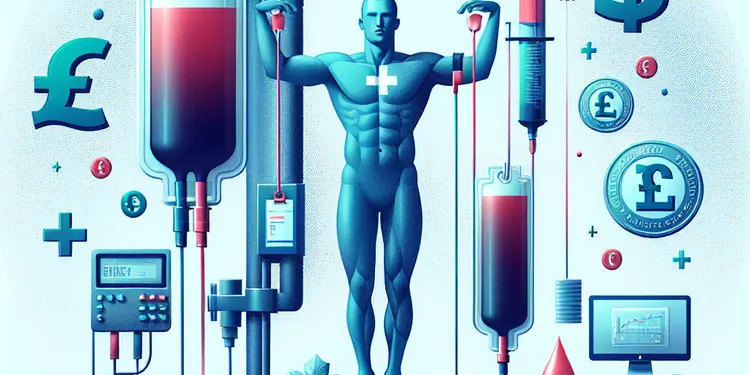
Find Help
More Items From Ergsy search
-
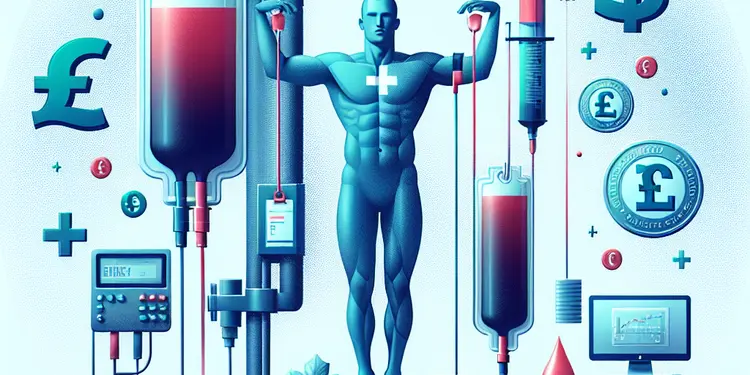
Can someone have a reaction to a mismatched blood transfusion?
Relevance: 100%
-
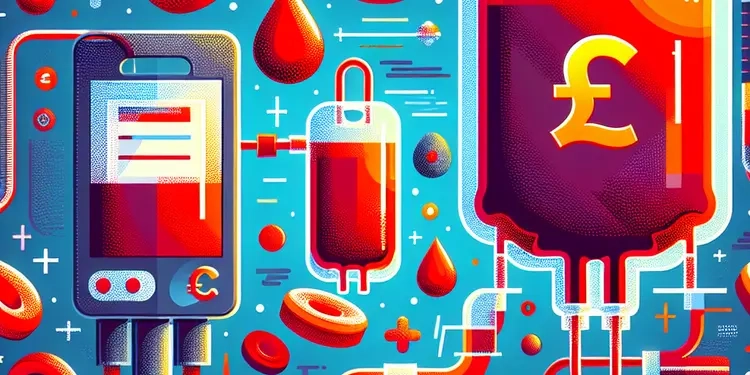
What is a blood transfusion?
Relevance: 58%
-

Are there risks associated with blood transfusions?
Relevance: 55%
-

Blood Product Transfusions
Relevance: 52%
-
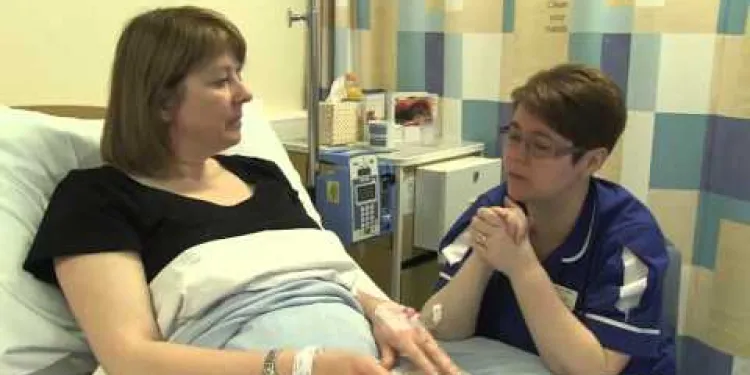
Blood Transfusion
Relevance: 51%
-
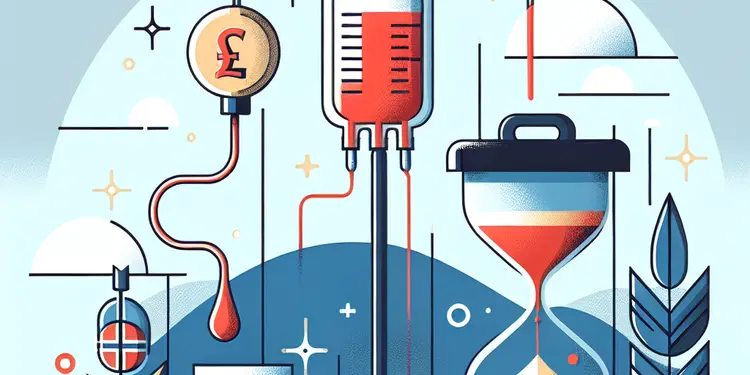
How long does a blood transfusion take?
Relevance: 49%
-
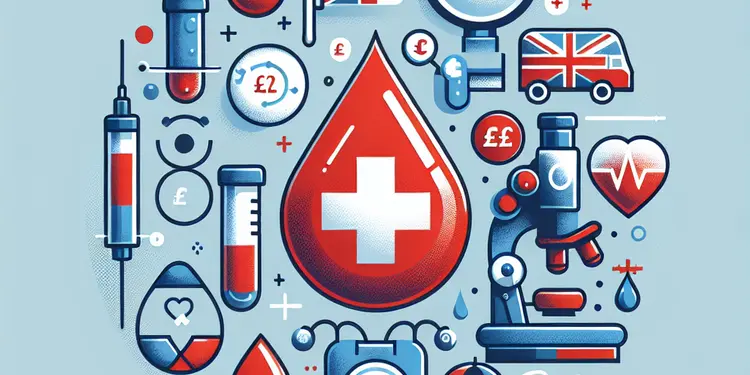
How do healthcare providers match blood for transfusions?
Relevance: 49%
-
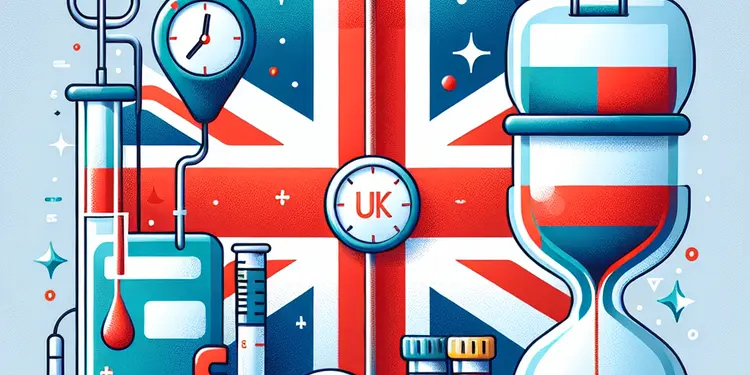
Is there an age limit for receiving blood transfusions?
Relevance: 47%
-
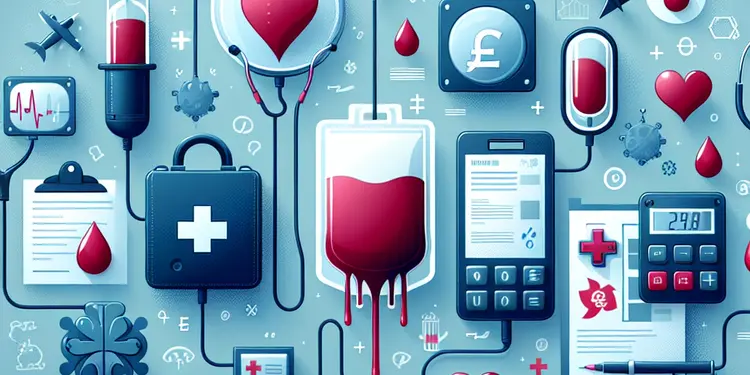
Can certain medical conditions prevent receiving blood transfusions?
Relevance: 47%
-
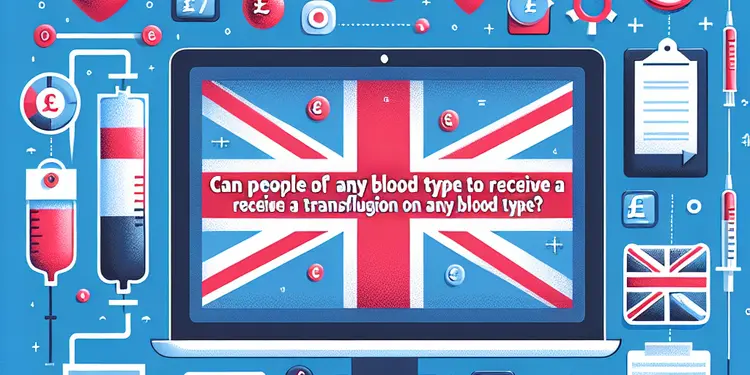
Can people of any blood type receive a transfusion of any blood type?
Relevance: 46%
-
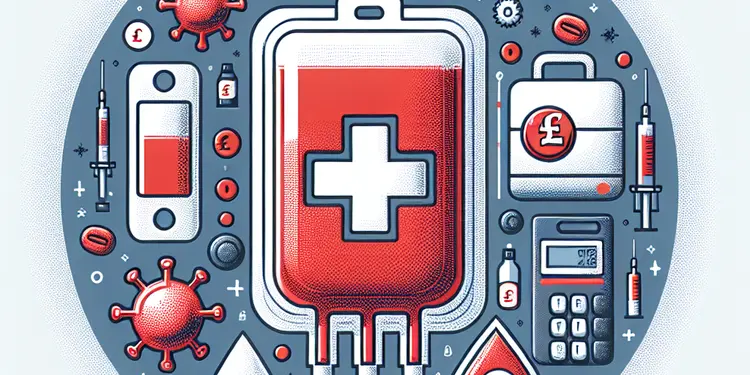
Is HTLV a risk in blood transfusions?
Relevance: 44%
-
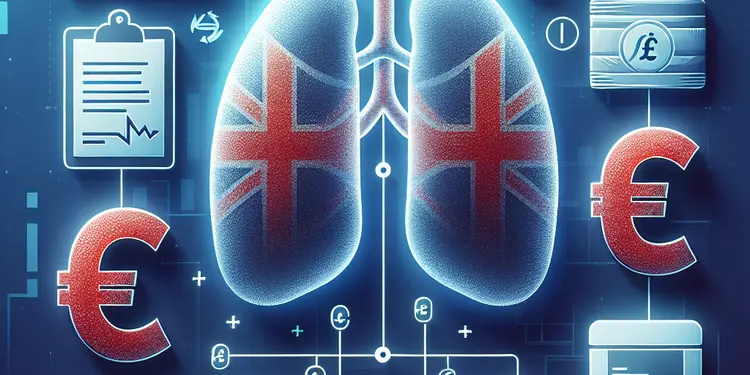
Is Hepatitis B a risk in blood transfusions?
Relevance: 43%
-
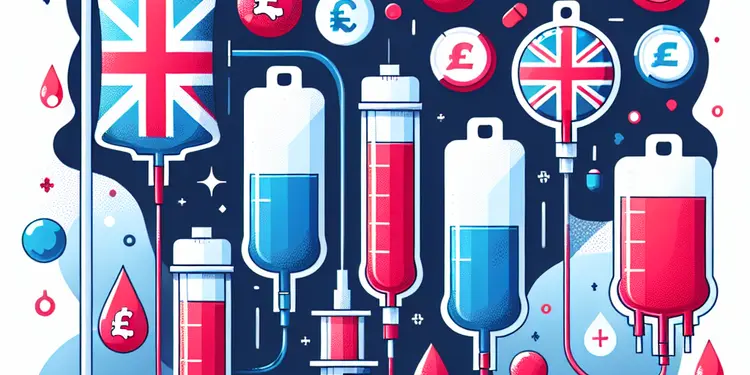
What types of blood products can be transfused?
Relevance: 43%
-
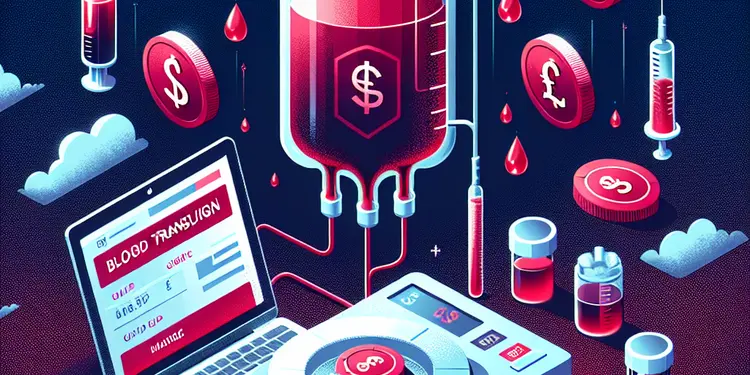
Why might someone need a blood transfusion?
Relevance: 42%
-

Is malaria still a concern for blood transfusion safety?
Relevance: 42%
-

What diseases can be spread by blood transfusions?
Relevance: 42%
-

Is Chagas disease a concern with blood transfusions?
Relevance: 42%
-
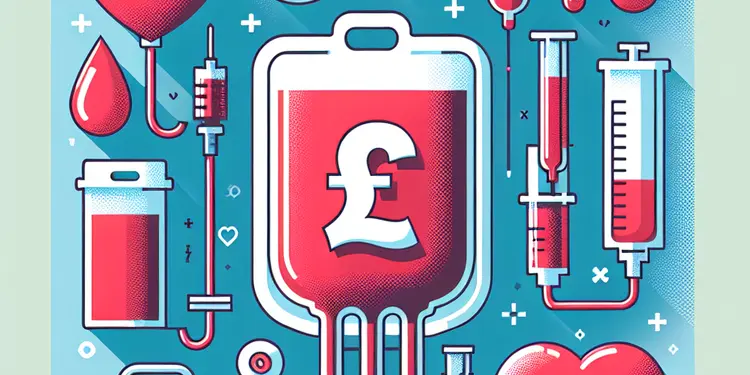
Can HIV be transmitted through blood transfusions?
Relevance: 41%
-
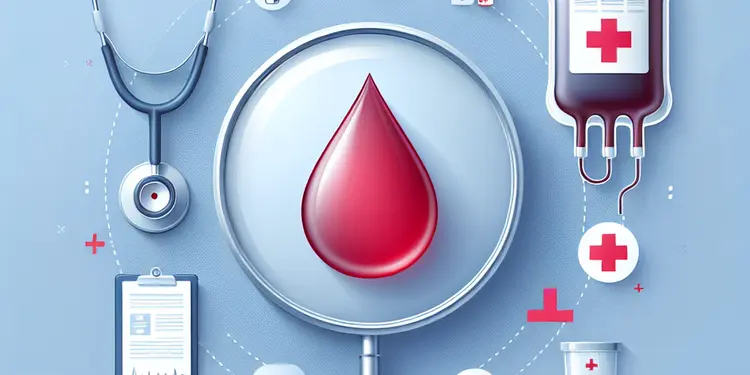
How do doctors determine how much blood is needed for a transfusion?
Relevance: 41%
-
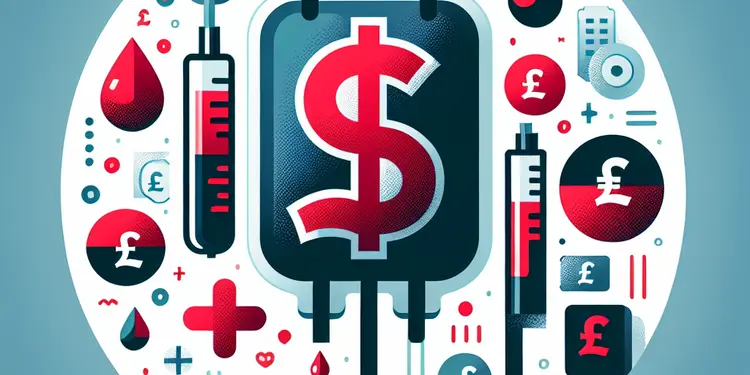
What are some common reasons blood transfusions are needed?
Relevance: 41%
-
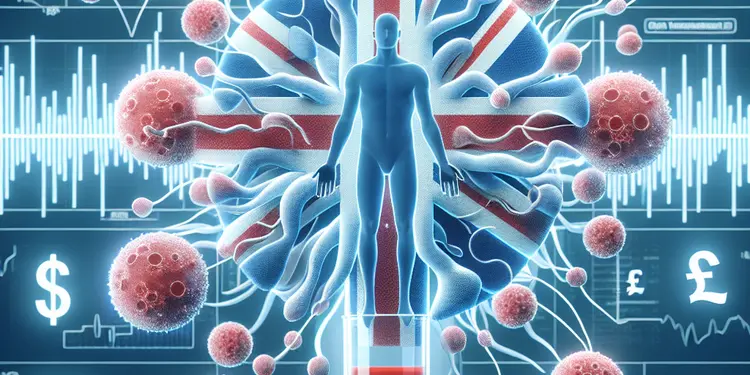
Can syphilis be transmitted via blood transfusion?
Relevance: 41%
-
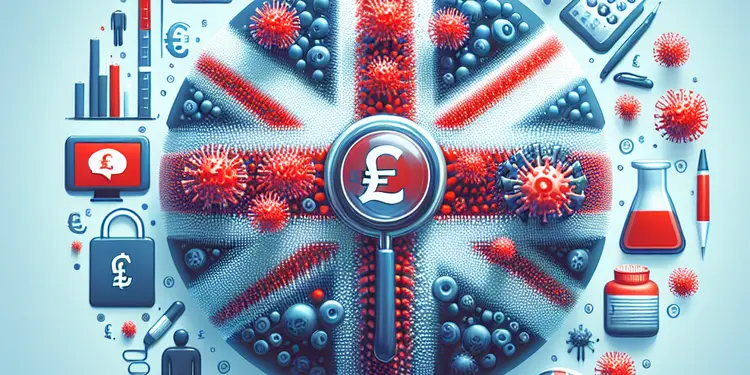
Is Zika virus screened for in blood transfusions?
Relevance: 41%
-
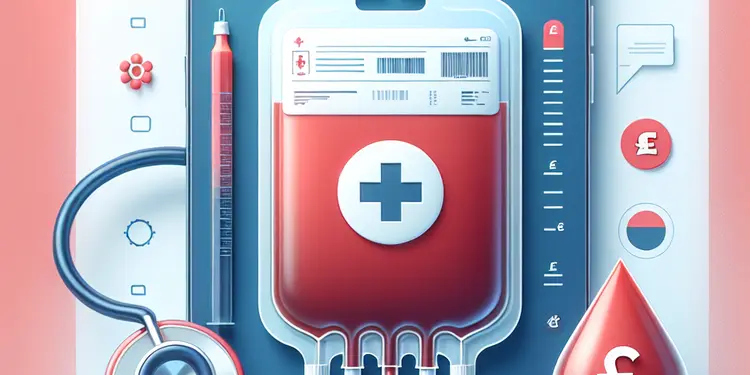
Can bacterial infections be transmitted through blood transfusion?
Relevance: 40%
-

Are there any parasites that can be transmitted through blood transfusions?
Relevance: 40%
-
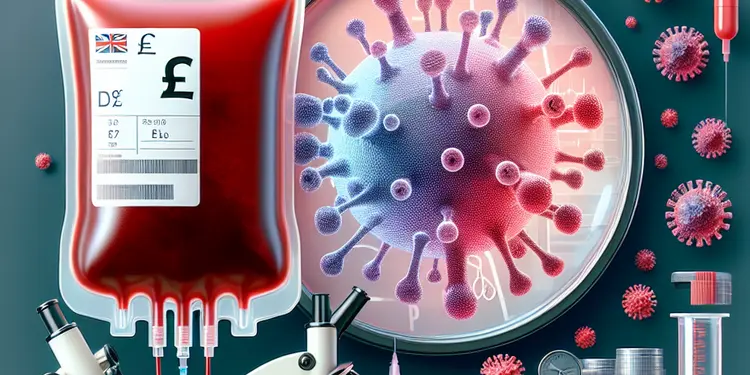
What is the most common disease transmitted by blood transfusion?
Relevance: 40%
-
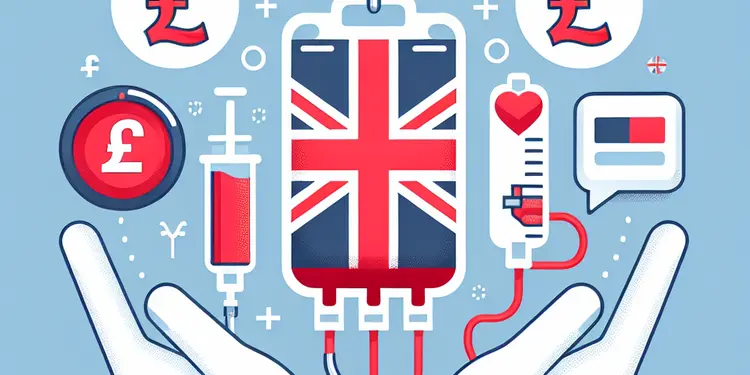
Can COVID-19 be transmitted through blood transfusions?
Relevance: 40%
-
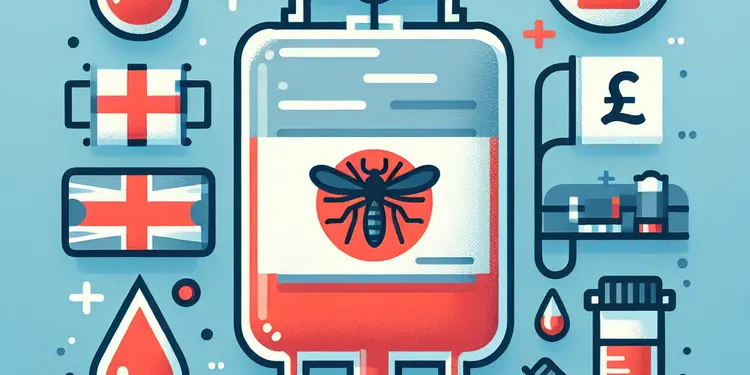
Can Dengue fever be transmitted through blood transfusions?
Relevance: 40%
-
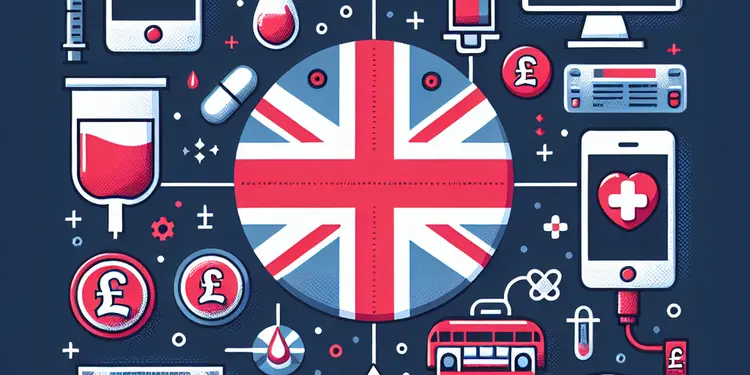
Is blood used for transfusions safe?
Relevance: 37%
-

What is plasma, and why might it be transfused?
Relevance: 37%
-
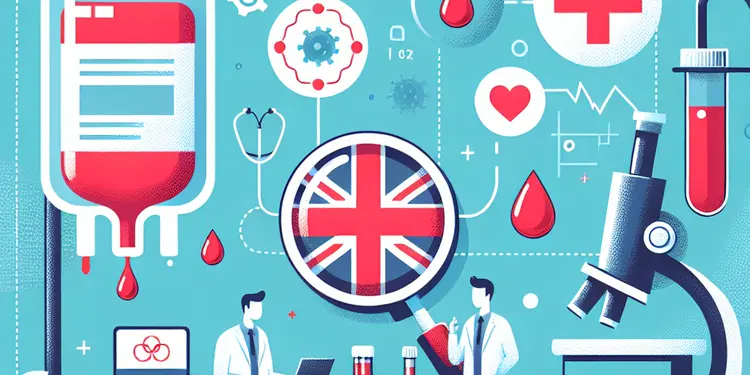
Can you get any prion diseases from blood transfusion?
Relevance: 37%
-
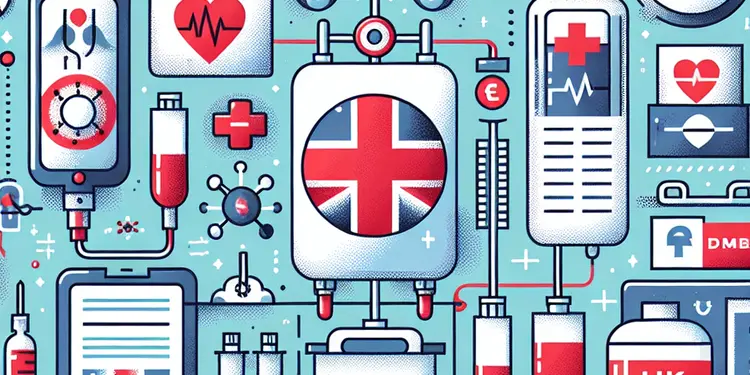
What measures are taken to prevent disease transmission in blood transfusions?
Relevance: 36%
-
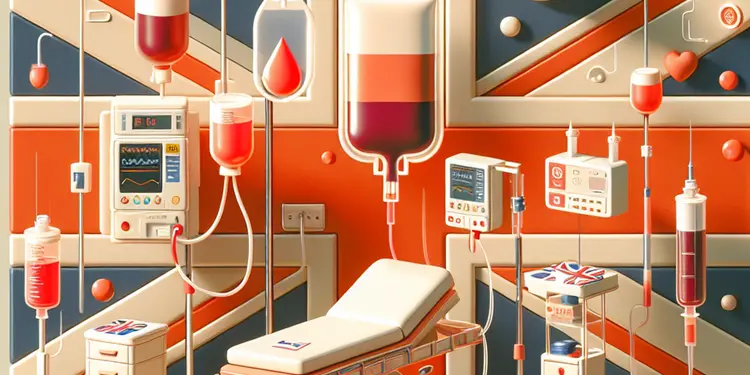
What should a patient expect after a blood transfusion?
Relevance: 33%
-
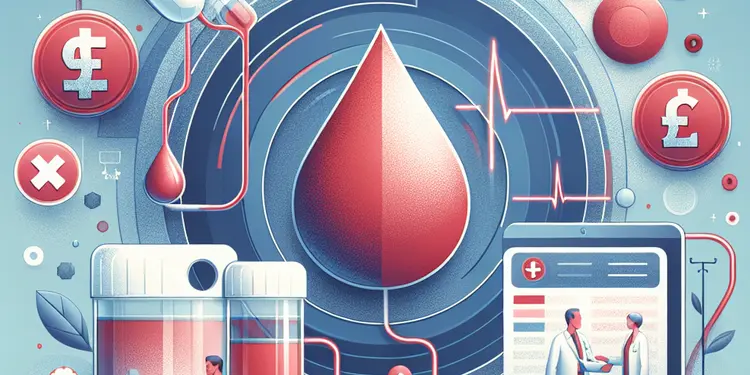
What kind of follow-up care is needed after a blood transfusion?
Relevance: 33%
-
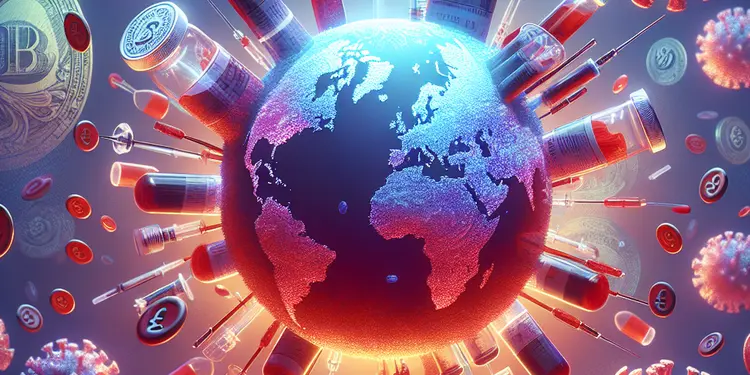
Can cytomegalovirus (CMV) be spread through transfusions?
Relevance: 32%
-

Are there global differences in screening for blood transfusions?
Relevance: 31%
-
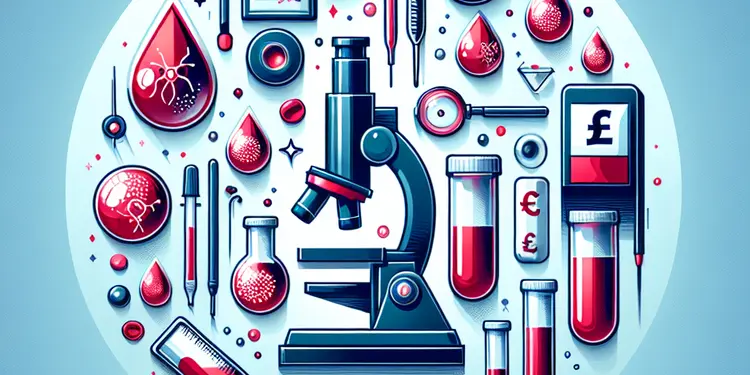
How is blood screened to prevent disease transmission?
Relevance: 31%
-
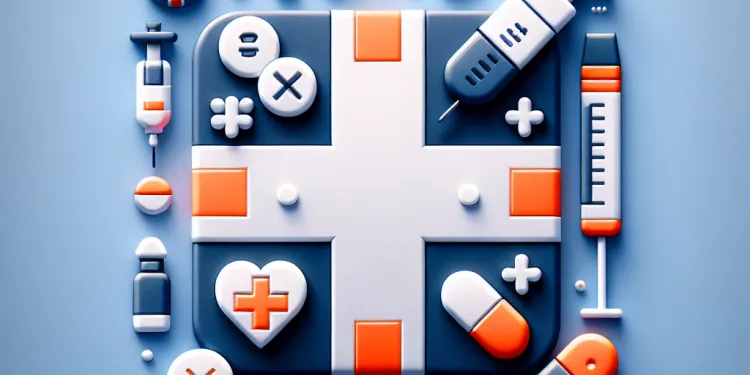
Does Ozempic cause allergic reactions?
Relevance: 29%
-

Is epinephrine the only treatment for severe nut allergy reactions?
Relevance: 26%
-

Can UK spiders cause allergic reactions?
Relevance: 26%
-
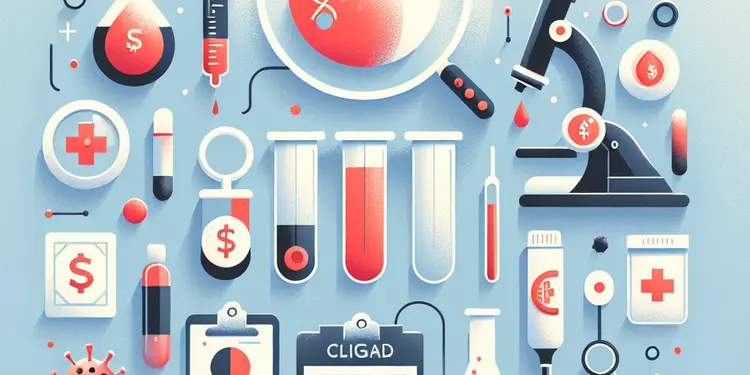
What other viruses are tested for in blood donations?
Relevance: 26%
Understanding Blood Transfusions
Blood transfusions are critical medical procedures where blood or blood components are transferred from a donor to a patient. They are used to treat a variety of conditions, including severe anaemia, significant blood loss due to surgery, and certain medical disorders where the body's ability to produce healthy blood components is compromised. In the UK, blood transfusions are performed under stringent guidelines to ensure safety and compatibility.
The Importance of Blood Type Matching
Blood type matching is crucial in transfusions due to the presence of antigens on the surface of red blood cells. The most important blood group systems are ABO and Rh. In the ABO system, blood types can be A, B, AB, or O, with each having specific antigens. Additionally, the presence or absence of the Rh antigen further categorises blood as either positive or negative. Compatibility between donor and recipient blood types is vital to prevent adverse reactions.
Causes of Mismatched Blood Transfusions
Mismatched blood transfusions, although rare, can occur due to clerical errors such as incorrect labelling, misidentification of patients, or oversight in medical records. Human error during the blood cross-matching process can also contribute to such incidents. The UK’s NHS Blood and Transplant service employs rigorous screening and cross-matching techniques to minimise these risks.
Symptoms of a Transfusion Reaction
When a mismatched blood transfusion occurs, the recipient’s immune system recognises the donor blood as foreign and mounts an immune response. Symptoms of a transfusion reaction might include fever, chills, flushing, shortness of breath, back pain, and dark urine. In severe cases, the reaction can lead to acute hemolytic reactions, renal failure, shock, or even death. Immediate identification and treatment are essential.
Managing a Transfusion Reaction
Healthcare professionals are trained to identify and manage transfusion reactions promptly. The transfusion is stopped immediately, and medical staff will assess the patient’s vital signs, provide supportive care, and perform additional testing to confirm the diagnosis. Treatment may involve administering intravenous fluids, medications such as antihistamines, corticosteroids, or, in critical cases, emergency interventions to stabilise the patient.
Preventive Measures and Safety Protocols
To prevent mismatched blood transfusions, the UK healthcare system adheres to strict safety protocols. These include double-checking patient identity, blood type, and donor blood details before transfusion. Furthermore, staff training, use of technology such as electronic barcode scanning, and robust incident reporting systems help enhance patient safety. The national framework ensures that blood transfusion services remain among the safest in the world.
Conclusion
While mismatched blood transfusions are rare, they can have serious health implications. Awareness, rigorous protocols, and technological aids are critical in preventing such occurrences. Continuous monitoring and advancements in transfusion medicine continue to safeguard patients and improve outcomes across the UK healthcare landscape.
Understanding Blood Transfusions
A blood transfusion is when a person gets blood from someone else. This can help if they have lost a lot of blood or if their blood is not working properly. Doctors are very careful when giving blood to make sure it is safe.
The Importance of Blood Type Matching
Blood types need to match because of special markers on blood cells. The main blood types are A, B, AB, and O. Blood can also be positive or negative. The doctor needs to give the right type of blood so the body does not get upset.
Causes of Mismatched Blood Transfusions
Sometimes, blood transfusions can go wrong if there is a mix-up with labels or records. To prevent mistakes, the NHS in the UK checks blood very carefully.
Symptoms of a Transfusion Reaction
If the wrong blood is given, the body might react. This can cause a fever, chills, breathing problems, back pain, or dark pee. Very bad reactions can be dangerous. It is important to tell a doctor right away.
Managing a Transfusion Reaction
Doctors know how to help if a reaction happens. They will stop the transfusion, check the patient, and give medicine if needed. This might include fluids or medicines to help the body calm down.
Preventive Measures and Safety Protocols
To keep blood transfusions safe, hospitals check everything twice. They make sure the right person gets the right blood. They use tools like barcode scanning to help catch mistakes. This means getting a blood transfusion in the UK is very safe.
Conclusion
While mistakes are rare, they can be serious. Knowing the risks and using careful procedures helps keep people safe. Doctors and nurses work hard to make sure blood transfusions are done right, helping patients stay healthy.
Frequently Asked Questions
What happens in a mismatched blood transfusion?
In a mismatched blood transfusion, the recipient's immune system attacks the transfused blood cells, leading to a serious reaction.
What are the symptoms of a mismatched blood transfusion reaction?
Symptoms can include fever, chills, shortness of breath, rapid heart rate, low blood pressure, and in severe cases, kidney failure and shock.
How quickly do reactions to mismatched blood transfusions occur?
Reactions can occur rapidly, often within minutes to hours of starting the transfusion.
What is the most common cause of a mismatched blood transfusion?
The most common cause is clerical error, such as mislabeling or misidentifying blood samples.
Can mismatched blood transfusions be fatal?
Yes, severe reactions can be life-threatening if not promptly treated.
What tests are done to prevent mismatched blood transfusions?
Blood typing and crossmatching tests are performed to ensure compatibility between donor and recipient blood.
Can a reaction to a mismatched transfusion be treated?
Yes, treatments may include stopping the transfusion, providing fluids, medications to support blood pressure, and dialysis if kidney function is affected.
What is 'acute hemolytic transfusion reaction'?
It is a severe, immediate reaction to a mismatched blood transfusion, where the recipient's immune system destroys the donor red blood cells.
Who is at risk of a mismatched blood transfusion reaction?
Anyone receiving a transfusion is at risk, but thorough blood typing and crossmatching mitigate this risk significantly.
What is the role of antibodies in transfusion reactions?
Antibodies in the recipient's blood can attack antigens on donor blood cells if compatibility is not ensured, leading to a reaction.
Why are blood types important in transfusions?
Different blood types have different surface antigens, and mismatches can trigger immune responses against the transfused cells.
What are the ABO and Rh systems?
They are vital blood group systems used to classify blood types, critical in ensuring compatibility for transfusions.
What should be done if a transfusion reaction is suspected?
The transfusion should be stopped immediately, and medical evaluation and supportive treatments should be initiated.
Can allergic reactions occur with blood transfusions?
Yes, although they are typically less severe, patients might experience hives or itching without mislabeling errors.
How can hospitals prevent mismatched transfusions?
By following strict protocols for patient identification, blood sampling, labeling, and double-checking before transfusions.
What is a delayed hemolytic transfusion reaction?
A reaction occurring days or weeks after a transfusion, as the body gradually builds up antibodies against the transfused blood.
Are there any long-term effects of a transfusion reaction?
Severe reactions might lead to long-term kidney damage or other organ issues, but minor reactions usually resolve without long-term effects.
Can someone have a mild reaction to a mismatched transfusion?
Yes, reactions can vary in severity from mild fever or rash to severe complications.
How is blood compatibility tested before transfusion?
Compatibility is tested through blood typing, screening for antibodies, and crossmatching tests to ensure no adverse reactions.
What are the regulatory standards for blood transfusion safety?
Regulatory bodies enforce strict guidelines on donor screening, blood testing, storage, and handling to ensure transfusion safety.
What happens if you get the wrong blood in a transfusion?
If someone gets the wrong blood in a transfusion, their body tries to fight the new blood. This can make them very sick.
What happens if you get the wrong blood in a transfusion?
If a person gets the wrong blood, their body might react badly. Here are some signs to watch for:
- Fever or chills (feeling very cold)
- Feeling sick to your stomach or throwing up
- Hard time breathing
- Pain in your back or chest
- Skin becomes red or itchy
- Feeling very tired or weak
If any of these happen, tell an adult or doctor right away.
You can use pictures or videos to understand better. Ask someone to explain it to you if you're confused.
You might feel sick with a fever, chills, or trouble breathing. Your heart might beat really fast. You could feel dizzy because your blood pressure is low. If things get very bad, your kidneys might not work, or you could go into shock.
How fast do problems happen with the wrong blood transfusion?
Reactions can happen fast. This can be in just a few minutes or hours after the transfusion starts.
What is the main reason for a wrong blood transfusion?
Sometimes, people get the wrong blood during a blood transfusion. This can happen if there is a mix-up or mistake. The main reason is often not checking carefully if the blood types match.
To help, doctors and nurses can use tools and checklists to make sure the blood types are the same before giving a transfusion. This helps keep everyone safe.
The main reason is mistakes when writing or typing, like putting the wrong label on blood samples.
Can the wrong blood transfusion be deadly?
When someone gets a blood transfusion, they receive blood from another person, called a donor.
Blood has different types. It's important to get the right type. If the blood types don't match, it can make you very sick.
Getting the wrong blood can even cause death.
If you have to get a blood transfusion, doctors will always check to make sure you get the right blood type.
Some people use tools to help understand better, like reading out loud or asking someone to explain things simply.
Yes, very bad reactions can be life-threatening if they are not treated quickly.
How do doctors make sure the right blood is given in a transfusion?
Blood tests make sure that the blood from a donor matches the blood of the person getting it. This is important so it is safe.
Can doctors help if the wrong blood is given?
Yes, treatments can help. They might stop the blood transfusion, give you fluids to drink, give medicine to keep your blood pressure normal, and help your kidneys if they are not working well.
What is an 'acute hemolytic transfusion reaction'?
An 'acute hemolytic transfusion reaction' is when your body gets upset after a blood transfusion.
Your body might think the new blood is not safe. This can make you feel sick.
If you need help understanding, you can talk to a doctor or nurse.
It is a very bad and quick reaction. It happens when someone gets the wrong blood. The person's body attacks the new blood cells from the donor.
Who might have problems if they get the wrong blood?
If you get blood from someone else, there can be risks. But doctors work hard to make sure it is safe. They check the blood type and match it carefully. This helps to keep you safe.
What do antibodies do in blood transfusions?
Antibodies are like tiny guards in your blood. They help keep you healthy.
If you get blood from someone else, sometimes these tiny guards can get upset. This happens if the blood does not match yours well.
When the tiny guards get upset, it can make you feel sick. This is called a transfusion reaction.
Doctors check blood carefully to stop this from happening.
If you are worried, talk to your doctor or nurse. They can answer questions and help you understand more.
If the blood from a donor doesn't match the person getting it, it can make the person's body react and attack the donor blood. This can cause problems.
Why do blood types matter when giving blood?
Blood types are like labels. They show what kind of blood someone has. People have different blood types, like A, B, AB, or O.
When someone gets more blood, like from a blood bag, it must match their type. If it doesn't match, they can get very sick.
Doctors check blood types to make sure it is safe. This keeps people healthy.
Using tools like matching games or flashcards can help you learn about blood types.
Blood comes in different types. Each type has special markers on it. These markers are like tiny flags.
If someone gets blood with different markers, the body might not like it. The body could try to fight the new blood.
Tools like picture cards can help explain blood types. Talking with a doctor or nurse can also help you understand better.
What are the ABO and Rh systems?
Blood is like a special juice in our bodies. It is very important for us.
The ABO system tells us the blood type. There are four types: A, B, AB, and O.
The Rh system shows if blood is positive (+) or negative (-). This means blood can be A+, A-, B+, B-, AB+, AB-, O+, or O-.
To learn more about blood types, you can:
- Watch simple videos on YouTube.
- Use picture books about blood and the body.
Blood groups help us understand different types of blood. This is very important when giving blood to people. It makes sure the blood matches and is safe for them.
What to do if you think there is a problem with a blood transfusion?
If you think a blood transfusion is causing a problem:
- Tell a doctor or nurse right away.
- Stop the transfusion if you can.
- Make sure the person gets help quickly.
Tools that can help:
- Use pictures or symbols to explain what to do.
- Have someone read the steps out loud.
Stop the blood transfusion right away. Call the doctor for help and get care to feel better.
Can you have an allergy when you get a blood transfusion?
Yes, sometimes people can get itchy skin or hives. This can happen even if there are no mistakes with labels.
How can hospitals stop blood mix-ups?
Hospitals want to give the right blood to people. Here are some steps to help:
- Check names and IDs: Make sure the person's name and ID match the blood bag.
- Use labels and colors: Put labels and colors on the blood bags to show what type it is.
- Train workers: Teach doctors and nurses how to check blood safely.
- Use computers: Use computers to help keep track of blood and stop mix-ups.
- Double check: Ask two people to look at the blood before giving it.
These steps can help keep people safe. You can use pictures and charts to help understand better.
First, we make sure we know who the patient is by checking their ID carefully. Then, we take a small amount of their blood the right way. We label the blood clearly so there is no mix-up. Finally, before a blood transfusion is done, we check everything twice to make sure it is all correct.
What happens in a delayed hemolytic transfusion reaction?
Sometimes, when a person gets new blood, their body doesn’t like it. It's called a delayed hemolytic transfusion reaction.
This happens when the new blood and the person's blood don’t match well. The body thinks the new blood is bad and tries to get rid of it.
The person can feel tired, have yellow skin (called jaundice), or their pee can look dark.
If this happens, they should go to the doctor. The doctor can help them feel better.
If someone has questions about blood transfusions, they can ask a doctor or nurse.
This happens when the body takes a few days or weeks to react after getting new blood. The body slowly makes special cells to fight the blood it got.
Can a blood transfusion cause problems later?
When someone gets blood from another person, it's called a blood transfusion. Sometimes, transfusions can cause problems. But we want to know if these problems last a long time.
If you're worried about this, here are some tips:
- Talk to your doctor. They can explain what might happen with blood transfusions.
- Ask a friend or family member to help you understand the information.
- Use pictures or videos to learn more about blood transfusions.
Big problems can hurt your kidneys or other parts inside your body for a long time. But small problems usually get better and don’t cause lasting harm.
Can a person have a small problem with the wrong blood transfusion?
Yes, some people might feel different after a reaction. It can be a little problem, like a small fever or rash. But sometimes, it can be a big problem.
How do doctors check if blood is safe to give you?
Before giving someone blood, doctors need to make sure it's safe. They test the blood to see if it matches the person's blood. This is called a "blood test." If the blood matches, it's okay to give it to the person.
Here are some things that can help:
- A friend or family member can help explain things.
- Use simple words and short sentences to understand better.
- Ask questions if something is confusing.
Doctors make sure your blood matches before a transfusion. They check your blood type, look for any special signs (antibodies), and do some tests to make sure everything is safe.
What are the rules to keep blood transfusions safe?
When someone gets a blood transfusion, there are special rules to keep everyone safe. These rules help doctors and nurses make sure the blood is good and safe to use.
If you want to know more, you can also ask a doctor or nurse to explain. They can help you understand how it all works.
Sometimes pictures or videos can make things clearer. You can ask someone to help you find these tools.
There are strict rules to keep blood safe. People check the donors, test the blood, and take care of it. This makes sure the blood is safe to use.
Useful Links
This website offers general information and is not a substitute for professional advice.
Always seek guidance from qualified professionals.
If you have any medical concerns or need urgent help, contact a healthcare professional or emergency services immediately.
Some of this content was generated with AI assistance. We’ve done our best to keep it accurate, helpful, and human-friendly.
- Ergsy carfully checks the information in the videos we provide here.
- Videos shown by Youtube after a video has completed, have NOT been reviewed by ERGSY.
- To view, click the arrow in centre of video.
- Most of the videos you find here will have subtitles and/or closed captions available.
- You may need to turn these on, and choose your preferred language.
- Go to the video you'd like to watch.
- If closed captions (CC) are available, settings will be visible on the bottom right of the video player.
- To turn on Captions, click settings .
- To turn off Captions, click settings again.
More Items From Ergsy search
-

Can someone have a reaction to a mismatched blood transfusion?
Relevance: 100%
-

What is a blood transfusion?
Relevance: 58%
-

Are there risks associated with blood transfusions?
Relevance: 55%
-

Blood Product Transfusions
Relevance: 52%
-

Blood Transfusion
Relevance: 51%
-

How long does a blood transfusion take?
Relevance: 49%
-

How do healthcare providers match blood for transfusions?
Relevance: 49%
-

Is there an age limit for receiving blood transfusions?
Relevance: 47%
-

Can certain medical conditions prevent receiving blood transfusions?
Relevance: 47%
-

Can people of any blood type receive a transfusion of any blood type?
Relevance: 46%
-

Is HTLV a risk in blood transfusions?
Relevance: 44%
-

Is Hepatitis B a risk in blood transfusions?
Relevance: 43%
-

What types of blood products can be transfused?
Relevance: 43%
-

Why might someone need a blood transfusion?
Relevance: 42%
-

Is malaria still a concern for blood transfusion safety?
Relevance: 42%
-

What diseases can be spread by blood transfusions?
Relevance: 42%
-

Is Chagas disease a concern with blood transfusions?
Relevance: 42%
-

Can HIV be transmitted through blood transfusions?
Relevance: 41%
-

How do doctors determine how much blood is needed for a transfusion?
Relevance: 41%
-

What are some common reasons blood transfusions are needed?
Relevance: 41%
-

Can syphilis be transmitted via blood transfusion?
Relevance: 41%
-

Is Zika virus screened for in blood transfusions?
Relevance: 41%
-

Can bacterial infections be transmitted through blood transfusion?
Relevance: 40%
-

Are there any parasites that can be transmitted through blood transfusions?
Relevance: 40%
-

What is the most common disease transmitted by blood transfusion?
Relevance: 40%
-

Can COVID-19 be transmitted through blood transfusions?
Relevance: 40%
-

Can Dengue fever be transmitted through blood transfusions?
Relevance: 40%
-

Is blood used for transfusions safe?
Relevance: 37%
-

What is plasma, and why might it be transfused?
Relevance: 37%
-

Can you get any prion diseases from blood transfusion?
Relevance: 37%
-

What measures are taken to prevent disease transmission in blood transfusions?
Relevance: 36%
-

What should a patient expect after a blood transfusion?
Relevance: 33%
-

What kind of follow-up care is needed after a blood transfusion?
Relevance: 33%
-

Can cytomegalovirus (CMV) be spread through transfusions?
Relevance: 32%
-

Are there global differences in screening for blood transfusions?
Relevance: 31%
-

How is blood screened to prevent disease transmission?
Relevance: 31%
-

Does Ozempic cause allergic reactions?
Relevance: 29%
-

Is epinephrine the only treatment for severe nut allergy reactions?
Relevance: 26%
-

Can UK spiders cause allergic reactions?
Relevance: 26%
-

What other viruses are tested for in blood donations?
Relevance: 26%


